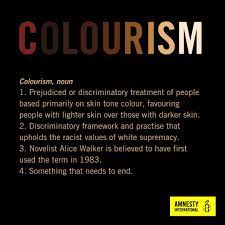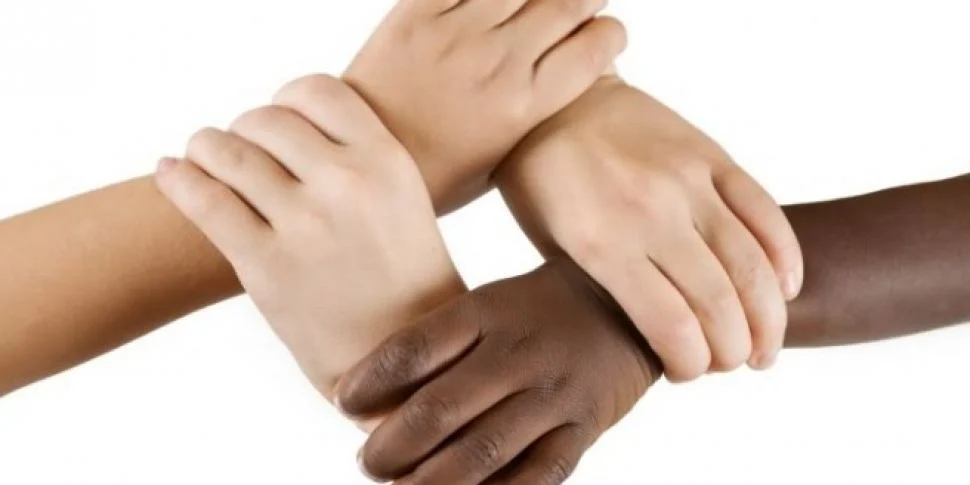How many times have you heard within your family, something along the lines of ‘he’s really good looking and fair’ or ‘she’s so fair’ with their eyes lit up? How many times have you heard something like ‘it’s all good but he’s quite dark’ with a tinge of sympathy or ‘I hate getting tanned!’ In a tone that’s a little bit uncomfortable? This is colourism. Colourism is a form of heavy discrimination within the same race, it’s internal, it’s a ‘within your own people’ problem… and boy, don’t we all know about it. I still struggle to believe that in 2022, it is STILL an issue, still, a thing that’s got to be spoken about and still an innate disease stirring in and amongst us.

When the British ruled India, discrimination based on skin colour was most visible. The white British foreigners were symbols of power, authority and wealth and thus, light skin served as a signal of high status across the country. Those individuals with a lighter skin colour enjoyed more privileges from the British, were considered to have a more affluent status and gained preference in education and employment and darker-skinned individuals were socially and economically disadvantaged, and this disease continued…
This dangerous phenomenon of colourism passed on, to the extent that huge, ‘forward-thinking’ corporate brands such as L’Oreal have had no qualms in putting up gigantic billboards across the busy roads of India advertising their skin-lightening products with famous celebrities such as Priyanka Chopra (who, ironically, likes to push herself as a humanitarian) being the face of such companies. So, is it really any wonder that the power of colourism has crept into our South Asian psyche so silently and so dangerously, that today in 21st century Britain, we are still so wrapped up about the colour shade of our own people.
In a Hadeeth, it is narrated: ‘We passed by Abu Dharr (Allah be pleased with him) in Rabadha. Abu Dharr (Allah be pleased with him) said, “I had a quarrel with one of my brethren whose mother was of foreign descent, so I vilified him as ‘you son of a black mother’. He went to complain about me to the Prophet ﷺ. When the Prophet ﷺ met me (one day), he said, ‘Abu Dharr, you are someone who still displays Jahiliyyah (ignorance).’ Now, this Hadeeth might be focused on racism rather than colourism but the concept is the same. Discriminating and belittling because of the colour of the skin was deemed as ‘someone who still displays ignorance’ by our Prophet ﷺ. Our beloved Prophet ﷺ was a forward-thinking man, he was progressive in his ideologies and so for him, this was incredibly backwards. He remarked to Abu Dharr (Allah be pleased with him) that he ‘still’ displayed signs of ignorance so imagine if our Prophet ﷺ was to see that 1400 years later, we, the South Asian community, STILL have deeply entrenched traits of colourism within us. We still have marks of ignorance. We still haven’t progressed. We still think fair skin = excellence and dark skin = inferiority.
If we zoom in, we can observe that colourism has played a dark and ugly role in the field of matrimony. I use past tense, but a huge part of me says that should be corrected to the present tense and that colourism still rears its ugly head in marriages. It beggars disbelief when a mother refuses to accept a girl for her son because she’s ‘a bit on the dark side’. When asked for a potential spouse, ‘fair’ is a requirement. Yes, ‘fair’. They are flagrantly and unashamedly stating that a person with darker skin shade is not good enough for their family.
Colourism is heavily embedded throughout South Asian culture. The lack of melanin in your skin isn’t just used as a marking point of attractiveness, but the colour of your skin is frequently used to determine your self-worth. And this toxic rhetoric spills out of the household, out of our communities, and feeds into racism beyond our culture. If we don’t like dark-skinned Asians, we definitely don’t like the Black community – it’s an uncomfortable truth, isn’t it?

I’d like to think the tide is slowly turning. The international brand Unilever recently announced it would no longer use the word ‘fair’ in the name of its popular (in South Asian countries) skin-lightening cream Fair & Lovely. Johnson & Johnson has discontinued two skin care products that promote “fairness”. While, most recently, L’Oreal has stopped using the words “fair”, “fairness”, “light” and “lightening” on its products. So we have some progress. But that’s just the tip of the iceberg. Colourism is so deeply embedded in our communities from the top down and unfortunately, we still have a lot of work to do. We actively need to hold conversations around it to stamp it out properly. It’s a mindset that needs to be changed and reformulated. We have to be more alert to the micro aggressions that have become a part of our daily dialect, especially amongst the older generations (‘she’s so dark’ ‘you need to scrub your tan off’, ‘I wish I was fairer’…) and be brave enough to challenge them.
Ismail ibn Nazir Satia (one who is in dire need of Allah’s forgiveness, mercy and pleasure)
1 Dhul Hijjah 1443